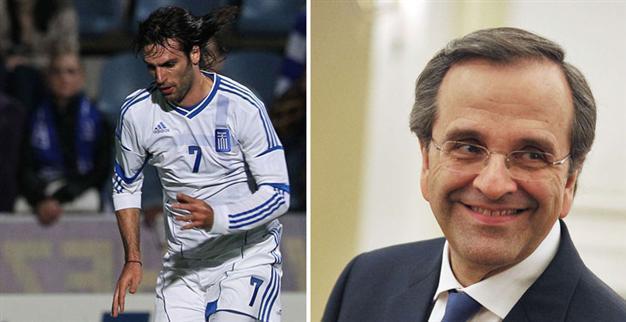Greece's double Samaras challenge for Germany
ATHENS - Agence France-Presse

Greece's national football team player Giorgios Samaras (L) and New Democracy party leader and newly elected Prime Minister Antonis Samaras.
A lanky, long-haired footballer and a new prime minister are taking turns this week to embody debt-mired Greece's hopes to contest German supremacy on the soccer pitch and in European finances.
And in both cases, a Samaras -- "saddle-maker" in Greek -- will be at the forefront.
Greece takes on Germany in the Euro 2012 quarter finals on Friday, a match that has rekindled a war of words between tabloids in the eurozone's most troubled member and Europe's increasingly impatient paymaster.
At the same time, a new Greek government sets out to stay in the euro currency and renegotiate the terms of its EU-IMF bailout in the hope of avoiding new cuts, a goal unlikely to curry much favour in Berlin and Brussels.
Newly-elected Prime Minister Antonis Samaras, 61, took over in Athens on Wednesday with the pledge to restore the recession-hit country to growth, a blueprint that will need the consent of Germany's tough-minded leaders.
Samaras will begin his bailout battle at an EU summit on June 28.
Meanwhile, spearheading the football team's attack on Friday will be 27-year-old Giorgos Samaras of Celtic FC, who is no relation of the PM.
The mercurial striker -- who has so far failed to score in the tournament -- said the Greek squad would play "for 11 million people who are hoping for us to do something worthwhile, so that they can get out in the streets to celebrate." The last time the two sides met in 2001, Germany won 4-2 in Athens. And in eight match-ups, Greece has only managed three draws and no wins.
German Chancellor Angela Merkel is doing her utmost to attend the Friday game, flying to Poland from a crucial four-way summit with the leaders of Italy, Spain and France in Rome which financial markets will be watching closely for signs of long-term solutions to the eurozone's debt crisis.
Merkel on Thursday said she would be "delighted" if the new Greek premier could join her at the game.
"For my part, I would be delighted if he came to Gdansk. If he can do that, he must say so himself, I cannot speak for him. In any case, it will be a good sporting occasion and, I hope, a very fair sporting event," Merkel said.
This time round, the only Samaras she is likely to see will be on the pitch.
"The prime minister will likely be announcing his government agenda in parliament on Friday," a conservative party source said.
"But we have accepted an invitation to Berlin," he added.
The younger Samaras sought to calm tempers ahead of the match, warning against "entangling" football and politics.
"It is bad to do that. Football is a game and we will play to enjoy it because we like it," the striker told a news conference at the team's base near Warsaw.
His team-mate Michalis Sifakis was less diplomatic however.
"I'd like this match to be the first for (Merkel) and the last for her team in the euro," the Greece goalie told Ta Nea daily.
"Germany are undoubtedly the favourites. But if we play as we did against Russia, we have nothing to fear," Sifakis said.
The new Greek prime minister met with Merkel during a European People's Party meeting in Brussels in March, after bowing to pressure to make written reform pledges in order to secure a new EU-IMF debt bailout. At the time, he had stressed the need for "immediate measures" to restore growth and unblock stalled EU-funded projects, which fell on deaf ears.
Instead, Germany continued to insist for months on Greece's obligation to honour promised spending cuts, even as the Greek economy sank deeper into recession and an unemployment rate of over 20 percent.
Germany coach Joachim Loew has also sought to play down the wider political significance of the match in the Polish city of Gdansk, telling reporters he is preparing his side for "a normal football contest." But while politicians and footballers have downplayed the crisis angle, newspapers in both countries have stoked the enmity.
"Bring us Merkel," read a headline in Goal News earlier in the week, while Germany's mass circulation Bild splashed: "Poor Greeks, we'll give you your next bankruptcy for free."
